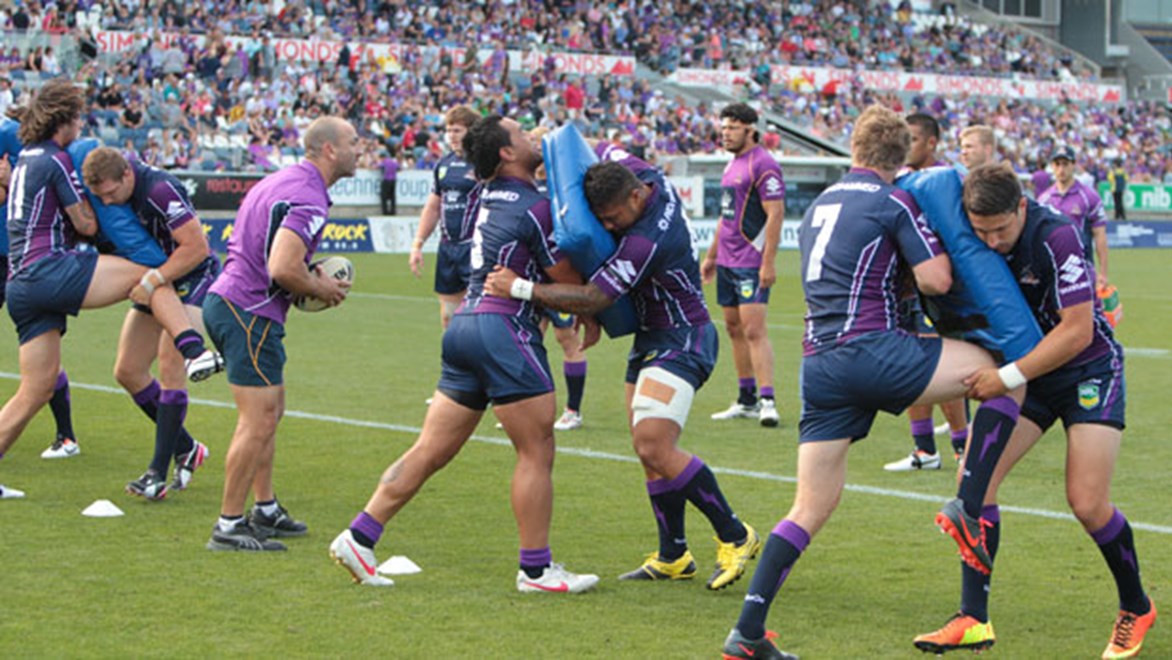

More often than not, the winner of any given NRL game is determined well before the players take the field.
While it’s true that victory is achieved through the combination of several vital on-field factors such as application, physical work, commitment, knowing your role in the team, ultimately the sweet reward at fulltime all boils down to a player’s attitude and mind-set before a game.
Pre-match preparation in the sheds matters more than you might think. Routine can vary slightly from team to team. Rarely will you see routine change a great deal within the club from week to week, working backwards from the kick-off time.
Winning can be distilled down to one important requirement: the start of the game needs to be dominant.
All teams will have their players arrive at the ground anywhere between an hour-and-a-half to two hours before a game starts. Thereafter, for the next hour or so, the players are left to do their own thing. Some seek comfort in focusing on anything but the 80 minutes they are about to play. Many do this by watching the Holden Cup or lower grade matches staged before they play. Others prefer to isolate themselves from all the hype and whack on a set of headphones and listen to music – the same stuff every week – as part of their routine.
Some are relaxed and talk a lot, some even joke; I personally reckon the jokes serve a purpose. They’re a cover-up for actual nerves. Other players are deathly quiet. They show no emotion, appearing to be in a trance.
Others seek solace in the dressing shed. There is always plenty of strapping, rubbing and stretching to be done.
As a general rule, players are comfortable with familiarity before entering the battlefield.
They will go through the same routines each week, sitting next to the same players, getting the same person to strap and rub them.
At this time there is often plenty going through the players’ heads but the key to this is to relax. It’s no good playing your game in your head and getting all hyped up, expending energy and then having nothing left come game time.
You’ll be surprised to know it is not uncommon for some players to become violently ill before every game, while others will drift around the dressing room chatting to anyone who wants to listen.
It’s a different story for a coach. This isn’t the arena for belting out instructions and screaming at players. A coach’s job is all but done by the time pre-match preparation is in full swing. He can, however, offer simple reminders about what the team has practised and perhaps add his own little motivational message – but even then his approach must be subtle and well timed.
Players can sense when their coach is nervous and not confident.
Usually with about 30-40 minutes before kick-off, the coach will have a team meeting where he will reassert points that the team need to identify with for the game ahead. This meeting doesn’t usually go long (maybe two or three minutes), with the skippers and senior players often reinforcing the messages they feel are relevant.
These meetings are almost the same each week, although a coach may sometimes vary it from time to time and use some sort of motivational video clip to help inspire his players.
Players then usually go for one of several nervous toilet stops and then head out to warm up.
Enter team leaders. Their role is crucial: they fire up the players to lift the intensity and generate enthusiasm. During the warm-up, as a coach you’re looking for a lot of energy and talk and while that doesn’t always translate to a victory, it at least gives your team the chance to start the game well – which more often than not can influence the end result.
With roughly five minutes left before kick-off, players will leave the field and return to the dressing room, where they have one last pit stop: another trip to the bathroom.
Many teams then gather together for one final message, and by then the coaching staff are making their way to the coach’s box, leaving the leaders to reinforce team goals.
When the two-minute bell sounds, the players are well and truly switched on. It’s game time, their huddle oozes energy, plenty of talk, hearts are racing, game plans in place, game faces are on.
It’s an embrace like no other.
